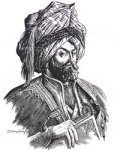Being the native inhabitants of their land, there are no "beginnings" for Kurdish history and people. Kurds and their history are the end products of thousands of years of continuous internal evolution and assimilation of new peoples and ideas introduced sporadically into their land. Genetically, Kurds are the descendants of all those who ever came to settle in Kurdistan, and not any one of them. A people such as the Guti, Kurti. Mede, Mard, Carduchi, Gordyene, Adianbene, Zila and Khaldi signify not the ancestor of the Kurds but only an ancestor. Archaeological finds continue to document some of mankind's earliest steps towards development of agriculture. Domestication of many common farm animals (sheep, goats, hogs and dogs), record keeping (the token system), development of domestic technologies (weaving, fired pottery making and glazing), metallurgy and urbanization took place in Kurdistan, dating back between 12,000 and 8.000 years ago.
Reconstruction of the Kurdish history is a difficult task. It frequently involves interpolation and extrapolation among a variety of sources written neither for nor about Kurds. Middle Eastern history has all too often (although not always) been written by its hegemons, and most recently the modern nation-states. The Kurds have not been hegemons for over 800 years. The result is that Kurdish contributions to history have been ignored, or worse, appropriated by other peoples (as to who or what is considered Kurdish in the present work, consult the Preface and National Identity). Any pioneering effort to reconstruct Kurdish history from fragments long buried and neglected is bound to raise questions and generate controversy, no matter how meticulous the research. This is to be expected because it challenges the status quo.

